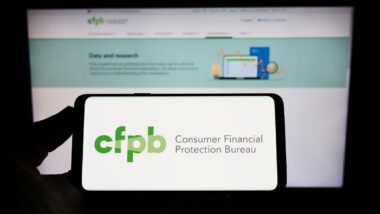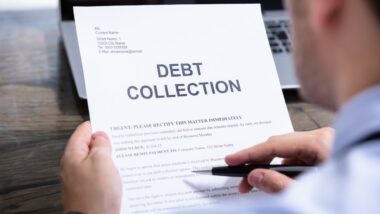Top Class Actions’s website and social media posts use affiliate links. If you make a purchase using such links, we may receive a commission, but it will not result in any additional charges to you. Please review our Affiliate Link Disclosure for more information.

What is the FDCPA?
The Fair Debt Collection Practices Act (FDCPA) is a federal law that prohibits the use of deceptive or harassing behaviors in the course of collecting a debt.
FDCPA regulations do not apply when collecting a personal debt. Instead, debt collectors are restricted by the law in the means and methods they can use when collecting a debt for a third party. This includes debt collection agencies seeking payment for credit card debt, medical bills, student loans, mortgages, and more.
FDCPA violations can include a variety of harassing and/or dishonest, behaviors, including:
- Threatening a debtor with violence or harm
- Using obscene or profane language
- Repeatedly calling a debtor in order to annoy them into paying a debt
- Misrepresenting the amount owed
- Lying about the identity of the caller (for example a debt collection agency saying it is an attorney or government representative)
- Claiming that legal action will be taken or that the debtor will be arrested
- Trying to collect interest, fees, or other amounts not allowed by the original contract or state law
- Depositing a post-dated check early
- Taking property illegally or threatening to do so
In the age of technology, consumers may find debt collectors using increasingly harassing phone call tactics in the process of debt collection. They may receive multiple calls a day, calls at odd hours or harassing debt collection calls even after they have asked the collection agency to stop calling. Debt collectors may use these methods to force debtors to speak to them and pay the debt they owe.
Luckily for consumers, these actions could be a violation of FDCPA – meaning that they may be able to take action against harassing practices.
Can I Sue for an FDCPA Violation?
According to the Federal Trade Commission (FTC), consumers can sue debt collectors in state or federal court within one year of an FDCPA violation. These lawsuits do not remove responsibility for debts but can help consumers hold debt collectors responsible for breaking the law.
These lawsuits enable consumers to recover damages resulting directly from illegal debt collection practices, such as lost wages or medical bills. Even if a plaintiff is unable to recover damages, the FTC notes that they may be able to recover up to $1,000 for FDCPA violations, in addition to attorneys’ fees and court costs.
Should a group of consumers file a class action FDCPA lawsuit, they can reportedly recover up to $500,000 in damages or 1 percent of the defendant’s net worth (whichever is lower).
If a debt collection phone call violated the Telephone Consumer Protection Act (TCPA), consumers may also be able to take legal action under this federal law. TCPA allows consumers to collect damages up to $1,500 per violation, meaning that plaintiffs may be eligible for even large awards.
How Do I Sue for an FDCPA Violation?
If you believe that a debt collection agency violated the FDCPA by calling you or engaging in other deceptive behaviors, you can speak with a qualified attorney who can help you gather evidence and determine if you are eligible to file a lawsuit.
Join a Free Debt Collection Calls Lawsuit Investigation
If you have received harassing calls from one of the banks or collection agencies listed on our investigation page in an attempt to collect on a debt within the last year, you may qualify to join this debt collection lawsuit investigation.
This article is not legal advice. It is presented
for informational purposes only.
ATTORNEY ADVERTISING
Top Class Actions is a Proud Member of the American Bar Association
LEGAL INFORMATION IS NOT LEGAL ADVICE
Top Class Actions Legal Statement
©2008 – 2024 Top Class Actions® LLC
Various Trademarks held by their respective owners
This website is not intended for viewing or usage by European Union citizens.















6 thoughts onHow To Sue For FDCPA Violation
I had a used vehicle salesman do an impermissible credit check on me. The only way that I found out was when I received the letter from the banking institution approximately two weeks afterwards . The salesman also did an impermissible credit check on the other person who drove me to the place of business also. That person never even entered the premises. The way I discovered that “Discount RV” in Milton, WA did this was when the banking institution sent the other persons letter to myself instead of sending it to them.
Please Add me
please include my name
Please add me
Please add me.
Please add me